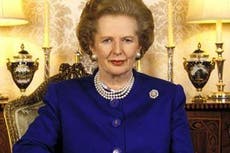The Independent's journalism is supported by our readers. When you purchase through links on our site, we may earn commission.
The Top 10: Adjectives That Come After the Noun
From arms akimbo to the Princess Royal via the President-elect, a list of English adjectives that come after the things they describe


This list started with (all right, was stolen from) a tweet by Dafydd Foster Evans, who pointed out, as a matter of “random linguistic nerdery” that elect, as in president-elect, is one of the few adjectives in the English language that comes after the noun.
There are actually a lot more than 10, and their origins are curious. They seem to be Norman French or Latin titles, or old heraldry, or French borrowings (pianist extraordinaire), or exclamatory adjectives, or Old English forms that have survived as fossil phrases, often religious. These are my favourites.
1. aforethought
2. akimbo, a fabulous word that should have featured in my Top 10 Words You Think Come from One Language but Come from Another, which is Middle English, kenebowe, probably from Old Norse (and not from Inuit or Swahili).
3. almighty, which is either old church language or exclamatory, like accomplished (mission) and galore.
4. apparent, as opposed to presumptive, which is the kind of heir who could be displaced by the birth of another.
5. general, as in attorney, major, secretary or witchfinder. And many other titles: fiscal as in procurator (nominated by Enid Driscoe), regent and emeritus.
6. immemorial
7. incarnate
8. martial, marshalled by Dan Dennis, who also suggested secondary modern, although that is short for secondary modern school.
9. militant, as in church, demanded by Peter Warner and Jeremy Lawford.
10. royal, as in princess, blood and battle. Thanks to Jeremy Lawford, who wished me a Christmas Merry and New Year Happy.
Thanks this week to Goblin Of Hanukkah, who nominated most of the above, plus “sterling”, which is an unusual word that probably comes from the little star (starling) on Norman pennies.
And to Mike R, who replied to the original comment: “I can introduce you to an apparent heir, a politic body and an almighty god that would disagree… Alive man! You may have a point, but it’s hardly positive proof, closed case and accomplished mission, is it?” Jonny Morris added lords spiritual to the body politic.
Guy Cudmore noted that food is a fertile source of inverted adjectives – eggs benedict, cod mornay, beef wellington and beef bourguignon. And that the Bee Gees were made up largely of the brothers Gibb. “This usage is often applied to groups. The name of the individual becomes the adjective qualifying the name of the group. Clan McTavish works in the same way. The UK contingent for the Olympic Games is called Team GB.”
Next week: Demonstrably inaccurate book titles, such as Krakatoa, East Of Java (it is to the west)
Coming soon: Nicknames for generals (such as James “Mad Dog” Mattis, named by Donald Trump as his Defense Secretary-elect, or -apparent, or -presumptive, or just -to-be)
The e-book of Listellany: A Miscellany of Very British Top Tens, From Politics to Pop is just £3.79. Your suggestions, and ideas for future Top 10s, in the comments please, or to me on Twitter, or by email to top10@independent.co.uk




Join our commenting forum
Join thought-provoking conversations, follow other Independent readers and see their replies